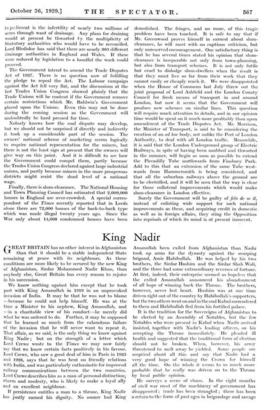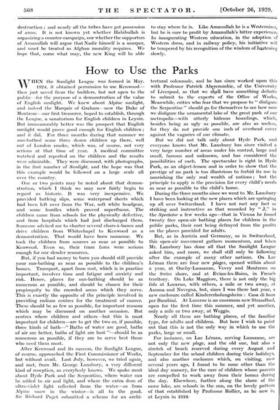King Nadir
GREAT BRITAIN has no other interest in Afghanistan than that it should be a stable independent State remaining at peace with its neighbours. As these conditions are more likely to be secured by the new King of Afghanistan, Sirdar Mohammed Nadir Khan, than anybody else, Great Britain has every reason to rejoice in his succession.
We know nothing against him except that he took part with King Amanullah in 1919 in an unprovoked invasion of India. It may be that he was not to blame —because he could not help himself. He was at the time a Minister to his nephew, King Amanullah, and —in a charitable view of his conduct—he merely did what he was ordered to do. Further, it may be supposed that he learned so much from the calamitous failure of the invasion that he will never want to repeat it. That affair, as we said, is the only thing we know against King Nadir ; but on the strength of a letter which Lord Crewe wrote to the Times we may now fairly say that we know certain facts positively in his favour. Lord Crewe, who saw a good deal of him in Paris in 1925 and 1926, says that he was bent on friendly relations with India, and was particularly enthusiastic for improved railway communications between the two countries. Lord Crewe describes him as a man of personal distinction; charm and modesty, who is likely to make a loyal ally and an excellent neighbour.
If persistence entitles a man to a throne, King Nadir has justly earned his dignity. No sooner had King Amanullah been exiled from Afghanistan than Nadir took up arms for the dynasty against the usurping brigand, Amir Habibullah. He was helped by his two brothers, the Sirdar Hashim and the Sirdar Shah Wali, and the three had some extraordinary reverses of fortune. At first, indeed, their enterprise seemed so hopeless that the exiled Amanullah announced his abandonment of all hope of winning back the Throne. The brothers, however, never lost heart. Hashim was at one time driven right out of the country by Habibullah's supporters, but the two others went on and in the end Kabul surrendered to them and Habibullah fled from his fortified palace.
It is the tradition for the Sovereigns of Afghanistan to be elected by an Assembly of Notables, but the few Notables who were present in Kabul when Nadir arrived insisted, together with Nadir's leading officers, on his accepting the Throne immediately. He pleaded ill health and suggested that the traditional form of election should not be broken. When, however, his army threatened to melt away he yielded. Some people are sceptical about all this and say that Nadir had a very good hope of winning the Crown for himself all the time. On the whole it seems to us much more probable that he really was driven on to the Throne by local public opinion.
He surveys a scene of chaos. In the eight months of civil war most of the machinery of government has disappeared ; trade has been strangled ; there has been a return to the form of past ages in brigandage and savage destruction ; and nearly all the tribes have got possession of arms. It is not. known yet whether Habibullah is organizing a counter-campaign, nor whether the supporters of Amanullah will argue that Nadir himself is a usurper, and must be treated as. Afghan morality requires. We hope that, come what may, the new King will be able to stay where he is. Like Araantillah he is a Westernizer, but he is sure to profit by Amamillah's bitter experience. In inaugurating Western education, in the adoption of Western dress, and in railway policy, his initiative will be tempered by his recognition of the wisdom of hastening slowly.



















































 Previous page
Previous page